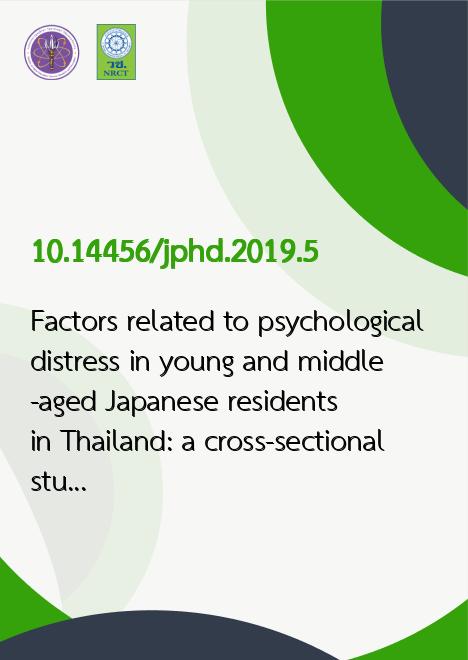
|
Factors related to psychological distress in young and middle-aged Japanese residents in Thailand: a cross-sectional study |
|---|---|
| รหัสดีโอไอ | |
| Creator | Shigeharu Tanaka |
| Title | Factors related to psychological distress in young and middle-aged Japanese residents in Thailand: a cross-sectional study |
| Contributor | Inoue Y, Watanabe O, Iwata K, Kaminiwa Y, Mogi K, Tanaka R, Miura Y |
| Publisher | ASEAN Institute for Health Development, Mahidol University |
| Publication Year | 2562 |
| Journal Title | JOURNAL OF PUBLIC HEALTH AND DEVELOPMENT |
| Journal Vol. | 17 |
| Journal No. | 3 |
| Page no. | 49-57 |
| Keyword | Japanese, Thailand, Psychological distress, Sociodemographic factor, Lifestyle |
| URL Website | https://www.tci-thaijo.org/index.php/AIHD-MU/article/view/217128 |
| Website title | https://www.tci-thaijo.org/index.php/AIHD-MU/ |
| ISSN | 2651-1258 |
| Abstract | The number of Japanese residents in Thailand exceeded 70,000 in 2016, and the number of Japanese businesspeople and their families is expected to increase. Overseas Japanese residents suffer from psychological distress related to living in religiously, culturally, and historically different environments. These stresses can cause mental illness. Several sociodemographic and lifestyle factors are related to psychological distress among overseas Japanese residents. However, no studies have investigated which factors have the greatest influence on psychological distress among Japanese residents in Thailand. This cross-sectional study aimed to collectively examine the factors related to psychological distress among young and middle-aged Japanese residents in Thailand. This study included 92 young and middle-aged Japanese residents in Thailand. Young and middle-aged status was defined as being aged from 25 to 65 years, based on the criteria of the Ministry of Health, Labour and Welfare in Japan. The data were collected using a self-registered online questionnaire system. The 12-item General Health Questionnaire was used to measure psychological distress and was the dependent variable. Participantsี sex, age, body mass index, family structure, language proficiency, and length of stay were assessed as sociodemographic factors, and lifestyle factors such as job status and physical activity were assessed as independent variables. Multiple regression analysis was performed to determine the factors predicting psychological distress. The results revealed that family structure (_ = 0.24, p < 0.05) and physical activity (_ = 0.21, p < 0.05) were significant factors. Living alone in Thailand and physical inactivity were associated with greater psychological distress. This study was the first to clarify the factors predicting psychological distress among young and middle-aged Japanese residents in Thailand. The current results may be helpful for supporting health-services providers to develop management programs for improved treatment of psychological distress among Japanese residents in Thailand. |
